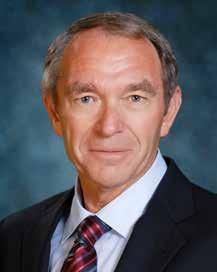
3 minute read
Oprah’s Got Nothing on Me
by Mark Levin, CAE, CSP Executive vice president, Chain Link Fence Manufacturers Institute 2022 Inductee, American Fence Association Hall of Fame

I’m old enough to remember when Time magazine was a major source of information for many Americans. Even though it was a weekly magazine, Time rose to prominence in an era when there was no social media, no internet, and no 24/7 television news cycle. I subscribed to it for more than 20 years, until it became just a thin version of its former self, slowly fading into oblivion like so many other periodicals. But even toward the end, I still looked forward to its “special issues” when it selected its Man (later Person) of the Year, or when it profiled its “World Most Admired People,”“World’s Most Influential People,” etc.
For years, it seemed as though there was one person – and only one person – who appeared in all of those “most” magazines – Oprah Winfrey. I could never figure out why. After all, Oprah’s not a world leader, or a renowned scientist, she is a talk show host! Why would that make her admired or influential? Of course, giving cars away to your audience doesn’t hurt your ability to be liked and admired.
“Recently, I was at an airport news stand and was stunned to see that Time magazine was still publishing its “Most Admired” list – and Oprah is still on it!! She still isn’t a world leader, she’s still a talk show host. What gives?
Then it hit me. One of the reasons that she’s so esteemed is that, if you really analyze it, Oprah never really had a talk show - she had (has) a listening show.
Watch her on her show, then compare her to other talk show hosts like Jimmy Fallon or Jimmy Kimmel, or even previous late-night hosts like David Letterman or Jay Leno. Note that the guests on those other shows always sit on a chair off to the side while the host sits center stage behind a raised desk. There’s no question about where the power is on those sets. And watch those other hosts do their interviews; they tend to lean forward, waiting for their guest to pause so they, the host, can get a joke or funny line in.
Then watch Oprah. Her guests are on a couch, literally inches away from Oprah. She gets eye to eye with them, and then she uses one of her most powerful secrets to success. Frequently, after her guest has made a comment, Oprah will begin her comment with something like “Well, you said….;” and then she uses her guest’s exact words before she starts to give her opinion. Whether she agrees with what the guest said or not, when someone hears you use their exact own words back to them, the only conclusion they can draw is – she must have been listening!
The audience draws the same conclusion. And that’s what people value, what they treasure: the feeling that what they say to you is important enough that you really listen to them. It’s a simple technique, and you don’t need to use it every time you want to say something, but if you want to build some real trust and effective communication in your workplace, or your home, for that matter, then build a reputation as someone who listens – to everyone.
If you are in the fence business, then you are in the sales business. It is so easy to get caught up in trying to convince customers to buy your product, or your services, that you barely let the customer finish saying something before you try to dazzle him or her with all the things your product does.
Sure, you believe in your product, your service, or your company, but that’s not what the customer wants. They said they want to buy a fence, but what they want is a solution to a problem. You cannot solve a customer’s problem unless you first listen to their problem. And that’s where Oprah excels. She doesn’t just listen to her guests, she gets them to believe she listened to them, by using their own words in response. Think about that the next time you are telling a customer what they can expect if they do business with you.
Bust out of your communication ruts by moving to that next level of effective listening. The response you get from others will amaze you.
As executive vice president of Chain Link Fence Manufacturers Institute for 38+ years, Mark Levin is also an author and avid promoter of the fence industry. He believes in the successful leadership qualities he promotes, including listening, delegating, consensus building, communications and effective decision-making.
Chain Link Fence Manufacturers Institute 10015 Old Columbia Road, Suite B215 Columbia, Maryland 21046 301-596-2583 info@chainlinkinfo.org www.chainlinkinfo.org
•
•
•
•
•









